- Home
- Richard F. Weyand
Galactic Mail: Revolution! (Childers Universe Book 3)
Galactic Mail: Revolution! (Childers Universe Book 3) Read online
GALACTIC MAIL
Revolution!
by
RICHARD F. WEYAND
Copyright 2017-2018 by Richard F. Weyand
All Rights Reserved
ISBN 978-09970709-9-6
Printed in the United States of America
Credits
Front Cover: Oleg Volk
Model: Katherine Nichols
Back Cover Photo: Oleg Volk
Published by Weyand Associates, Inc.
Bloomington, Indiana, USA
February, 2018
CONTENTS
Family Legacy
Safety Play
The Legacy Continues
A Voice From The Past
Allies
Training
Frustration and Triumph
Decision and Action
Hesitation and Resolve
Notification
GMS Mnemosyne
“... or by such other group ...”
Under Arrest
Captain Bowers
Now What?
A Quick Trip
Kalnai
Ship Security
Research
Preparation
Gathering Forces
Poking the Bear
A Private Navy
The Battle of Kalnai
Confrontation
Sylvain Costa
The Extent Of The Rot
New Capabilities
Taking Odla
Unfinished Business
Delayed Mail
Stepping Down
Horizon
Family Legacy
Emily Gunderson sat in a rocking chair on the big front porch of Campbell Hall, the large stone house her grandfather, Maximillian Childers Campbell, had built in the hills overlooking the city of New Hope on the planet Horizon almost a hundred years before. Her attention was not on the stunning view of the city and the valley in which it lay, however. Instead she watched her great, great grandchildren playing in the yard that sloped gradually away from the house toward the tree line below.
With her sat her great grandchild, Pamela Lieber, the mother of three of the young children cavorting below. They were all together here at the big house for Founders Day, the annual holiday celebrating the founding of the colony, a hundred and twenty years ago this year.
“Pamela, dear.”
“Yes, Grandma Gunderson?”
“I need to tell you a story, so that it not be lost.”
“You should write it down,” Pam said.
“No. This story can never be written down. You must promise me that, my dear. That you will never write it down, but that you, too, will pass it on to one of your great grandchildren when your time grows short. It is a story I was told by my own great grandmother, Grandma Childers, almost seventy years ago, when I was about the age you are now.”
Emily had Pam's attention now. Grandma Childers was a legend on Horizon, but not for her incredible military career, or for the founding and early leadership of Galactic Mail, but for Childers House. Stir-crazy in her retirement, and seeing a need, Jan Childers had founded and run the charity that ensured that no orphan, no widow, no veteran on Horizon was ever abandoned to their own meager resources. If you were down and out, Childers House was there for you. It never turned anyone away. Initially funded by Childers herself, those who had benefitted and turned around their lives, and those who believed in its mission, saw to it that it remained well-funded. It was celebrating the one hundredth anniversary of its founding this year.
Emily gripped Pam's arm, on the arm of the rocker next to hers, and looked her in the eye.
“Can you promise me that, Pamela? That you will pass on the story, never write it down, see to it that it is carried on?”
“Yes, Grandma Gunderson. I promise.”
“Good, good.”
Emily patted Pam's arm, settled back in her chair.
“It begins before Grandma Childers moved here to Horizon, when she was running Galactic Mail....”
Safety Play
Jan Childers, Bill Campbell, Tien Jessen, Jeanette Xi, and Jake Durand were meeting in a secure conference room in the headquarters building of Galactic Mail on the planet Doma. It was three years since the founding of Galactic Mail, and the operation was finally fully up and running. Childers was CEO, Campbell, her husband, was head of Intelligence and Security, Jessen was head of Operations, and Xi was vice president. Durand had retired as head of the Intelligence Division of the Commonwealth Space Force, and moved to Doma for his retirement. He was there as a consultant.
“The reason I wanted to get together is to address one big concern that keeps gnawing at me,” Childers said. “I don't know what to do about it yet, and I want you all to think about it.
“We need a safety play. A reset button, if you will. What happens if all this–” Childers waved her hand around in the air – “goes off the rails? Becomes a government? Becomes a tyranny? How do we reset it? How do we – from the grave – reassert control and get it back on its mission? Assume we need to do it twice. The first time, according to our estimates, is probably in a hundred and fifty years or so. How do we do that?
“I don't want to talk about it today. I want you to think about it. I want to meet every other week to discuss it until we solve it. No notes, nobody else involved. We need a plan first.
“How do we, a hundred and fifty years from now, after we're all dead and buried, recognize the problem, kick out the rats, and restore this institution to its proper mission?”
“You basically want to build in a revolution,” Durand said.
“Correct. The big questions are, How do we know when a revolution is necessary, and, How do we ensure it succeeds?”
“So you've had a couple of weeks to think about it. Let's kick it around a little bit and see where we are,” Childers said.
“I think the first obvious thing is that it has to be something outside the organization. A hundred and fifty years is too long for organizational solutions. It would allow someone too much time to figure out how to disable whatever mechanism we come up with. It has to be something the rats don't know is there, that has the element of surprise,” Durand said.
“Which implies an organization outside the organization. Have we just moved the problem one layer deeper? Who watches the watchers?” Bill asked.
“The first thing you did to keep it from becoming a government is to use a different organizational structure, the corporation. How about another organizational structure to keep an eye on it?” Xi asked.
“What kind of organizational structure?” Childers asked.
“Family,” Xi said.
“You mean a family legacy sort of deal? Each person passes it on to someone in the next generation?” Bill asked.
“Probably more like two or three generations, but yeah,” Xi said. “As each watcher grows old, they pass it on to one member of the young adult generation. That reduces the wander in the story.”
“They can also pick who among their great grandchildren are the most stable, the most mature, the most reasonable people,” Childers said.
“You're going to have people die prematurely, though. The story will be lost,” Durand said.
“We can start multiple chains. If each of us tells two of our great grandchildren, we would have ten chains going forward. We can calculate the individual odds of those being broken, come up with some expectations about how many of the chains survive for a given time period,” Jessen said.
“That's only eight chains going forward. Jan and I will have the same family links,” Bill said.
&nbs
p; “We can bring in some others, until we have the numbers we want,” Jan said. “So how would this work?”
“Some number of them have to agree things are off the rails,” Bill said.
“Then how do we keep this new group from taking over whenever they want?”
“They don't have to each know about the others. They can think they're the only ones,” Xi said.
“Or at least not know who the others are,” Durand said.
“That would work as well,” Xi said.
“How do they vote then?” Bill asked.
“Mail. Simplest way. When one thinks it's off the rails, they send a mail. If the system gets so many mails, it kicks in,” Jessen said.
“How do we keep the mailbox from being discovered?” Durand asked.
“Some sort of password system. If the password is in the mail, then it gets through. If not, you get a 'no such mailbox' reply,” Jessen said.
“It's got to be a password that can be remembered, but not written down. We don't want anything written down,” Childers said.
“Some string from a document or a book would work. You just have to remember which book,” Bill said.
“OK, so. We have our watchers, and the required number send their mails. Now what happens?” Jan asked.
“Well, it has to be computerized, or you need another organization to carry it out,” Jessen said.
“Agreed. But what are computer systems going to be like in a hundred and fifty years? How can you write something now that will run on whatever it is?” Durand asked.
“We could write it in COBOL,” Childers said.
“In what?” Durand asked.
“Sorry. Very old Earth joke,” Childers said.
“Actually, there's probably a way to do this,” Jessen said. “You can't upgrade every computer at once in a big network. No matter how much the technology changes, you have to be able to accommodate other versions. That's where trans-compilers come in.”
“Trans-compilers?” Xi asked.
“Yes, a software program that translates code to a new system. It processes existing source code to generate new source code for the new system, then compiles it to run on the new system,” Jessen said.
“But won't it be obvious what the source code does?” Bill asked.
“No. Trans-compiled source code is basically unreadable. What we do is write the code in a previous generation system, then trans-compile it to the current systems. It's just part of what we use, at that point. Nobody will be able to decipher it. We'll embed it in the system, and they'll just keep trans-compiling it forward,” Jessen said.
“And storage? Protection against a completely new system?” Childers asked.
“We'll build it like a virus. It will always try to handshake with itself in the systems it talks to. If it doesn't see itself, it will replicate itself. We can also embed it in the ships. The hyperspace engine computer code is what calculates the gravitational stresses and the transition points. Nobody wants to mess with that. I'll have to look into it a bit, but we should be OK,” Jessen said.
“And we'll be able to test this?” Childers asked.
“Oh, yes. No way I'm going to rely on untested code. We should be able to set up a closed environment and test it.”
“All right, so assuming we can do all that, what does the code do?” Childers asked.
“Stops obeying orders from the powers that be, and takes orders from the family members, I would guess,” Durand said.
“Whatever we do, though, doesn't it have to be in line with the corporate by-laws? To be legal?” Bill asked.
“Go read the immutable portion of the by-laws again,” Childers said.
“This really has been bothering you for a long time, hasn't it?” Durand asked.
“Oh, yes. It's in there. Couched in legal gobbledygook, but it's in there,” Childers said.
It was two years before Jessen was able to report: “It's done.”
“The code is in there?” Childers asked.
“Yes, and it's replicating itself throughout Galactic Mail.”
“And how many are in the inner circle now?”
“Twelve counting you and Bill only once,” Jessen said.
“So we'll have twenty-four chains going forward.”
“Correct. And the odds are we'll still have twenty at one hundred and fifty years.”
“We've done what we could,” Childers said. “I hope it works.”
The Legacy Continues
“... and that's the story my great grandmother Emily Gunderson told me almost seventy years ago, my dear, on this very porch” Pamela Lieber said.
Her great granddaughter Patricia Dawson looked at her with wide eyes.
“That's unbelievable, Grandma Lieber. That was how many years ago now, that Grandma Childers put in her safety mechanism?”
“Oh, let's see. It was about ten years before she moved here, and she moved here when she was sixty years old. And Grandma Childers has been dead now, what? Almost a hundred and twenty years, I think. At age one hundred and five. So that would make it a hundred and seventy years or so? I think that's right.”
“And it's never been needed,” Dawson said.
“Not yet. But you need to keep watch, my dear. You need to keep the watch. My time on guard is over now.”
“And what is the mailbox, and what is the password?”
“The mailbox is simple enough. Jan Childers at Galactic Mail. Send mail there, and unless it contains the password, you'll get a message back that there's no such mailbox.”
“And the password?”
“Grandma Childers was a student of history, Patty. There is an old Earth document that was one of her favorites, called the Declaration of Independence. There are two hundred and two words, beginning with “We hold these truths to be self-evident” that she considered the most important words ever written in any language. Any twelve consecutive words from those two hundred and two can be used as the password, except the last twenty-two words.”
“What are the last twenty-two words, Grandma Lieber?”
“They're your vote that Galactic Mail is off track, that it has spiraled into despotism. Those words are “it is their right, it is their duty, to throw off such government, and to provide new guards for their future security.” Send those words to Grandma Childers' mailbox, and, once enough of your fellow Watchers agree, the leadership of Galactic Mail will be overthrown.”
“Overthrown?” Dawson asked.
“None of the computers will obey the leadership. Their computer accounts will be frozen. None of the ships will obey their orders. The ships' captains will get secret orders not to obey them. Instead, they will all obey you and your fellow Watchers. And you will have secret instructions waiting as well.”
“That's – I don't know what that is. That's incredible. That twenty-four people, spread around the galaxy, can just flip the switch.”
“The power of Galactic Mail being in the wrong hands is a terrible prospect, Patty. It's what Grandma Childers was most worried about, all those years ago,” Gunderson said. “Now, you need to send a message to the mailbox, just the password and 'Childers 2', so the computer knows you are the new Watcher in this chain, and knows where to find you.”
“I'll do that right now.”
“Please do, dear.”
Dawson pulled out her comp, found the ancient text, selected twelve words, added 'Childers 2,' and mailed them to Jan Childers at Galactic Mail.
“Done,” Dawson said.
Lieber sighed, and sank back in her chair.
She had not broken the chain.
A Voice From The Past
The acknowledgement to Patty Dawson's mail message to Jan Childers' mailbox at Galactic Mail came in return mail the next day. It was a huge VR file. With the twins off at pre-school, she had time to log into the VR system and open it.
She found herself in a full-immersion VR, on the porch of Campbell Hall, looking out over New Hope. The ancient ston
e house looked relatively new, while the bustling modern city she was used to was little more than a large town. She sat in a rocking chair on that porch.
Dawson turned to look at the woman sitting next to her. She had never been tall, but was even more shortened with age. Her white hair was short, her skin thin and white as new parchment. She sat with a blanket over her lap, and a cup of tea steaming on the table between them.
The aged figure turned to her, and Dawson was transfixed by her eyes. Those dark brown eyes were the eyes of a person used to command, to the wielding of tremendous authority. With a shock, in the old woman's features Dawson recognized her own, the family resemblance clear.
“Hello, grandchild. I am Jan Childers.
“That you are seeing this recording means that you are the next person in the chain of Watchers, intended to keep an eye on Galactic Mail. I cannot know how many years have passed by now, or which generation you are. I cannot answer your questions, but I can probably anticipate many of them. It is for that purpose this recording is being made.
“When we created Galactic Mail – Bill Campbell, Jake Turner, Miriam Desai, myself, and others – we bound it with all the legal and administrative chains we could to keep it from morphing into a government. Yet we expect such chains will thin and weaken under the constant pull exerted on them. It is for this reason we put in place another mechanism to restrain Galactic Mail. Twenty-four chains of our descendants, who have extraordinary access into the systems on which Galactic Mail depends, and who can reset the organization to its original, limited purpose.
“You are the newest member of this group, and this is your initial briefing on your position, your powers, and your responsibilities.
“We set up Galactic Mail to solve a single problem, the predation of one star system upon another, throughout all of human space. To put a stop to interstellar war, permanently. An ambitious goal, to be sure. Yet, as I sit here talking to you, it has held now for over fifty years.

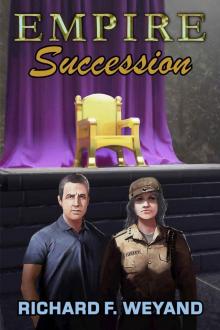 EMPIRE: Succession
EMPIRE: Succession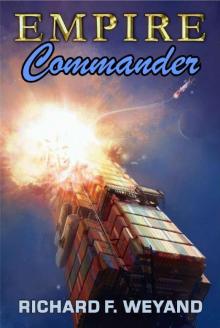 Commander
Commander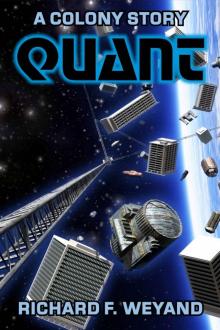 QUANT (COLONY Book 1)
QUANT (COLONY Book 1)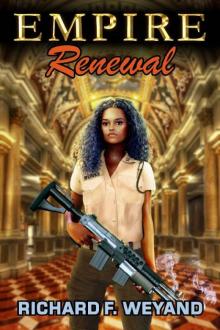 EMPIRE: Renewal
EMPIRE: Renewal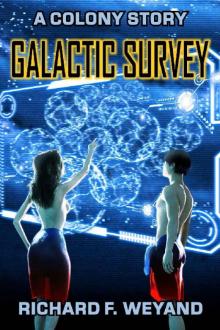 GALACTIC SURVEY (COLONY Book 3)
GALACTIC SURVEY (COLONY Book 3)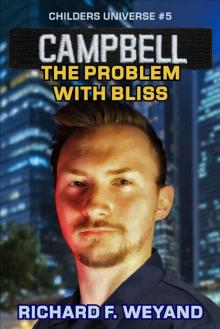 Campbell- The Problem With Bliss
Campbell- The Problem With Bliss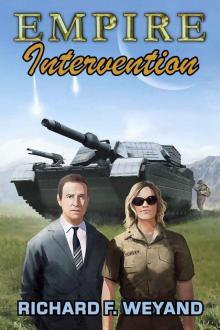 EMPIRE: Intervention (EMPIRE SERIES Book 13)
EMPIRE: Intervention (EMPIRE SERIES Book 13)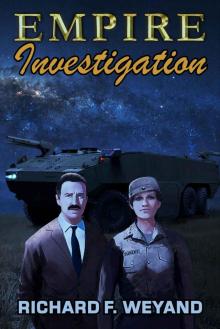 EMPIRE: Investigation
EMPIRE: Investigation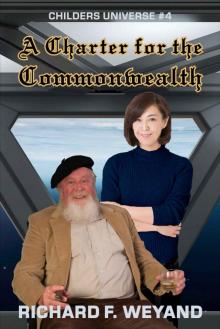 A Charter for the Commonwealth
A Charter for the Commonwealth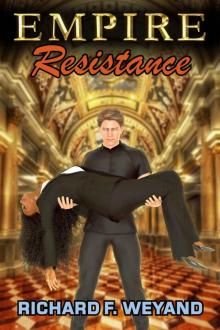 EMPIRE: Resistance
EMPIRE: Resistance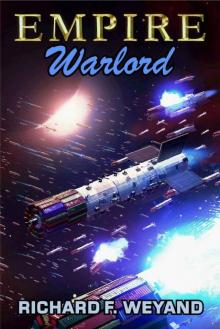 EMPIRE: Warlord (EMPIRE SERIES Book 5)
EMPIRE: Warlord (EMPIRE SERIES Book 5)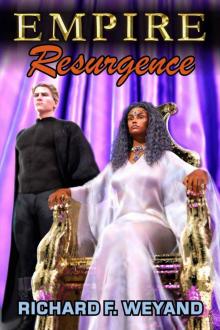 EMPIRE: Resurgence
EMPIRE: Resurgence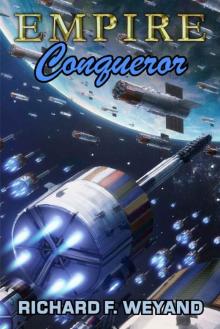 EMPIRE: Conqueror (EMPIRE SERIES Book 6)
EMPIRE: Conqueror (EMPIRE SERIES Book 6)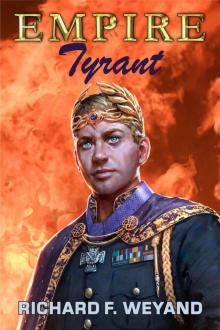 Tyrant
Tyrant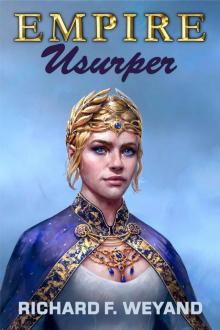 Usurper
Usurper Galactic Mail: Revolution! (Childers Universe Book 3)
Galactic Mail: Revolution! (Childers Universe Book 3) Galactic Mail_Revolution!
Galactic Mail_Revolution! Childers
Childers CHILDERS_Absurd Proposals
CHILDERS_Absurd Proposals